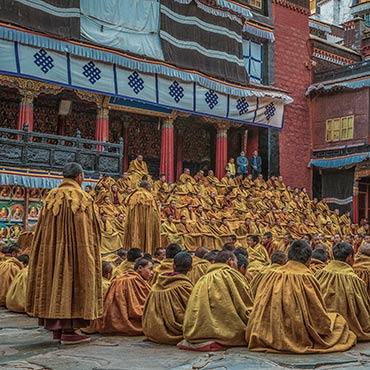
Traditional Chinese music can seem quite confounding to the outsider.
Between the large array of unusual instruments, ear-piercing sounds, elaborate costumes worn during performances – and without the thousands of years’ context afforded to local Chinese people – classical Chinese music, it can be very difficult to make sense of it all. To the uninitiated who want to gain an appreciation of what’s behind the music, it’s essential to explore beyond the superficial to the rich, deep background of this style of music that continues to influence modern musicians all over the world.
Understanding the history of traditional Chinese music


Traditional Chinese music is symbolic of many aspects of culture in China. Steeped in history and reflecting an evolution over millennia, the origins of music in China have been traced back 8,000 years. Incredibly, a flute made of bone was uncovered in Henan, a central landlocked province in China. Archeologists and historians purport this special discovery indicated people of that time were musically minded. This is not a surprise given that Henan is considered the cradle of Chinese civilization. A more ‘recent’ musical discovery emerged just 6,000 ago when clay instruments were discovered in Xi’an.
From these rudimentary beginnings, history reveals an evolution of high notes, often reached at times when the creative arts were esteemed through philosophical and imperial influences.
Imperial influences in classical Chinese music

A discussion on the history of traditional Chinese music would be incomplete with reference to the role it played in rites and rituals, both in imperial courts and within the various regions and people throughout China.
During the Zhou Dynasty, which ruled China from the 10th to 7th century BC, a form of music called Yayue (雅乐) emerged. Yayue – which translates as ‘elegant music’ – was the ceremonial and court music that was formalized over this time.
As with so much of Chinese culture, Yayue was layered with symbolism and meaning. The sounds of nature were interpreted by music created through instruments. Yin and yang reflected balance within the universe. Connection between the five elements (water, fire, earth, air, and space) was fundamental to Yayue music, as was the concept of harmonizing nature and the circle of fifths theory, used to convey the relationship among the 12 tones.
Philosophy’s role in traditional Chinese music

The influence of philosophy in traditional Chinese music must start with reference to Confucianism. Unlike the Yayue school of thought, Confucianism was founded on a belief in the divinity of rites and music, and a connection between music and emotions, lifestyle and community.
In Chinese music, there are few words more famous than these: “Music is that which moves man from the internal; rites are that which affects man on the external. Music brings about harmony. Rites ensure obedience.” They are said to come from the Record of Music of the Book of Rites based on the lost work of Confucius, Classic of Music.
Music and rituals were considered inseparable from the nature of heaven and earth. Moving away from them was to veer from the true nature of the universe. In short, music provided the means by which harmony of the self could be realized.
Confucian teachings on the role of music were expressed in several significant books, namely The Book of Rites and The Musical Records. These, among others, are considered essential reading for anyone keen to study traditional Chinese music.
Not everyone throughout Chinese history felt the same way about music that Confucius did. Mozi, a philosopher born after the death of Confucius (and of whom he was originally a follower) was very clear about his views on Chinese music. Under his own beliefs he denounced “music as a wasteful activity”. Although Mozi was an influential thinker, it is believed the asceticism of Mohism was counter to the true nature of humans; unsurprising given his views on music!
Traditional Chinese musical instruments

The unusual instruments played in traditional classical music are yet another element contributing to this unique music form. Taking influences from other Asian instruments and musical styles, including the erhu and pipa (Central Asia) and India’s heptatonic scale (which was eventually left behind), China emerged with its own collection of musical instruments.
Probably most recognizable is the qin, which gained in prominence and popularity during the Tang Dynasty period (618-907 AD), however there are many other string, woodwind, and percussion instruments used in traditional Chinese music.
| Percussion | bells, chimes, drums, gongs, cymbals, boards |
| String | liuqin, pipa, ruan, guzheng, yueqin, sanxian |
| Wind | flute, sheng, xiao, suona, bawu , guan |
While a western music student might wonder about the shape or materials used to create them, Chinese musical instruments are intended to convey neutrality, simplicity, moderation, implicitness, and ethereal artistic expression.
Chinese opera

Typically, traditional Chinese music is played in ensembles and orchestras, and as part of the many forms of traditional Chinese opera. Across China there are over three hundred different types of opera. Among these, the most common types of opera are
While Chinese opera music may sound unmelodious, there is a rhyme and reason to it. Stories are based on well-known ancient tales and music is provided as a complement to the story, elaborate costumes, and exaggerated make-up, with its accentuated eyes and dramatic colors.
Music of the minorities

In a country with 56 different ethnic groups, there is a rich diversity in traditional or folk music. Although music from the Han Chinese dominates, there are dozens of other types of ethnic music varieties. Although there was a period during the twentieth century when ethnic music was not given free expression, there has been a resurgence over the past two decades, with high profile performances in different regions throughout China giving prominence to this important cultural heritage.
Yangshuo’s Impression Sanjie Liu is one such example. Set on the Li River, this outdoor night show includes local ethnic fishermen, women, and children who sing Liu Sanjie’s folk songs against the spectacular karst stone backdrop at night. This style of performance has been emulated elsewhere and is just one way that Chinese musical culture is being preserved and shared.
Traditional Chinese music is just one aspect of Chinese culture . If you’re keen to learn more, explore our China Travel Guide for more great information. Be travel ready and make the most of your time on a China culture tour. Our team of travel consultants can advise on enriching activities and experiences that will make for beautiful travel memories from your China vacation. Reach out -We are here to help!




 Thanks China Tours
Thanks China Tours





